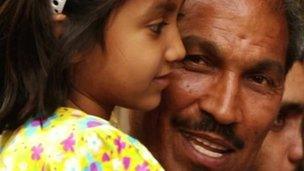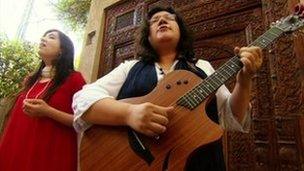Will hope or fear triumph in 'rollercoaster' Pakistan?
- Published
Doucet subtitles
Pakistan recently saw the first handover of power from one democratic government to another in its history. Is there hope for the future of the country? For the BBC's monthly programme, The Editors, which sets out to ask challenging questions, I decided to find out.
You hear a lot about Pakistan in the news... but you don't hear enough about Pakistanis in the news.
The headlines are a litany of bomb blasts, rising militancy, growing corruption. These are the stories which lead you to think Pakistan is a failing state. Some even warn it's at risk of being a failed state.
Pakistanis themselves talk about a nation on the brink, about continual crises that jolt their society and their own sense of self.
But they also fight for greater democracy, put their lives on the line, take to the streets and take on those with power to change all this for the better.
On a recent visit to the city of Lahore, often called Pakistan's cultural capital, we found people from all walks of life who haven't lost hope or their sense of humour.
"That's Pakistan," remarks Pakistan newspaper editor and television anchor Najam Sethi with an infectious chuckle.
"It's a rollercoaster ride. You never know what's going to happen," he adds.
He offers an image of a nation hurtling up and down as we sit in his television studio with camera lights and tripods at one end - and a wooden cabinet with family linens at the other.
After receiving death threats. Najam says he had no choice but to broadcast from his bedroom-converted studio in his Lahore home, where armed guards are stationed outside.
In truth, it's no laughing matter.
A recent report by the Committee to Protect Journalists, external described Pakistan as one of the world's deadliest nations for the press. Killers operate with impunity. There has not been a single conviction for the murder of more than 20 journalists in the last decade.
Najam, known for his outspoken liberal views, has been warned about credible threats from militant groups, as well as alleged risks from Pakistan's own intelligence services.
He and his family stayed away from Pakistan for a while, but found they couldn't keep away.

What does the future hold for this little girl in Pakistan?
"We do get these pangs of insecurity, disquiet, and discomfort. But at the end of the day, there's no solution but to stay," he says.
In a country of dark forces, there is still a lot of light.
On the closing night of the recent Fashion Week in Lahore, cameras flashed, sparkles rained gently on a catwalk and there were bright smiles all round as models displayed an eye-catching range of fashion.
It could be Milan, London, or Paris.
But it's Pakistan, where daring cuts of cloth are not just a fashion statement but a bold vision of a vibrant, tolerant society.
"We work against all the odds," exclaims designer Hassan Sheheryar Yasin, known as HSY, who was a creative force behind the evening.
He sees a spirit forged in Pakistan since its very birth as a nation: "From 1947 to this day, I don't think there has been a single time of what I would call stability."
But, he explains with a wide grin: "We work under pressure better than we work without pressure."
Musical cousins Zeb and Haniya also draw on Pakistan's rich history to find a source of the nation's resilience in its own melting pot of cultures.
The two women sing in Pakistan's own languages, but also in Turkish and Persian, strong threads in their country's ancestral fabric.
Zeb says: "Pockets of positive things are happening. It's really about finding that thread that connects everyone and then mobilising it."

Cousins Zeb and Haniya say positive things are happening in the country
"Extremists do one act and it is repeated on television 500 times in the next few days," she regrets.
Haniya chimes in: "I feel, as all history, this is temporary. I just hope change comes around sooner."
In Lahore the breathtaking architecture can transport you through the centuries of the Mughal dynasty, the Sikh empire and the British Raj.
But real life is lived in a less charming tangle of illicit electricity wires and the roar of generators in a country where power cuts can last all day.
High walls hemmed by coils of razor wire protect the privileged while the poor live in tumbledown dwellings along crowded streets.
In the Old City, we stop to chat with 65-year-old Syed Ahmed, who has been fixing watches nearly all his life.
"Everyone is worried. We have all this tension in our lives," he tells me.
"Don't curse the Taliban because they will come after you," another worried man pipes up from the crowd which quickly gathers round.
That's Pakistan.
A country where millions struggle every day just to survive, and where many are still willing to speak out, and fight, for a better day.
But, if history has any lessons, it must be that change must come at some point, and better sooner, than never.
BBC News: The Editors features the BBC's on-air specialists asking questions which reveal deeper truths about their areas of expertise. Watch it on BBC1 at 23:20 BST on Monday 24 June or catch it later on the BBC iPlayer or on BBC World News.